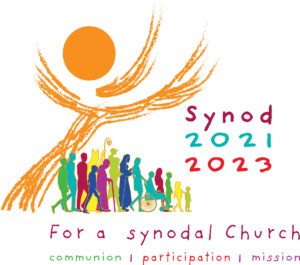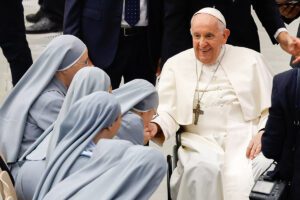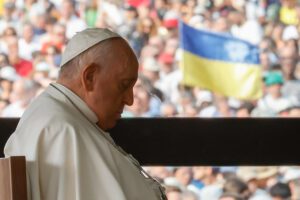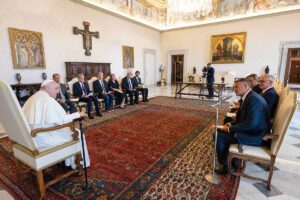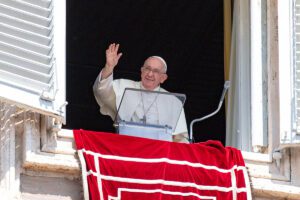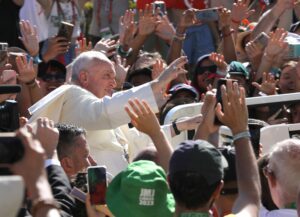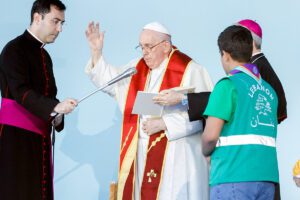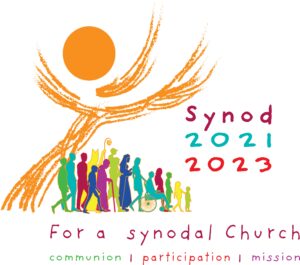VATICAN CITY (CNS) – People must end the “senseless war against creation” and help victims of environmental and climate injustice, Pope Francis said.
“We must do this by resolving to transform our hearts, our lifestyles and the public policies ruling our societies,” the pope said in his message for the 2023 World Day of Prayer for Creation.

Some injustices needing immediate responses are “economic policies that promote scandalous wealth for a privileged few and degrading conditions for many others,” the continued exploration and expansion of fossil fuel infrastructures, and “predatory industries” depleting and polluting freshwater sources, he wrote in his message.
The World Day of Prayer for Creation, which will be celebrated Sept. 1, marks the start of the ecumenical Season of Creation. The season concludes Oct. 4, the feast day of St. Francis of Assisi, patron saint of ecology. The theme for 2023 is “Let justice and peace flow,” based on the verse from Book of Amos (5:24), “Let justice surge like waters and righteousness like an unfailing stream.”
The verse describes how God wants justice to reign and to “flow forth wherever it is needed,” the pope said in his message.
“God wants everyone to strive to be just in every situation, to live according to his laws and thus to enable life to flourish,” he wrote. When the faithful keep “a right relationship with God, humanity and nature, then justice and peace can flow like a never-failing stream of pure water, nourishing humanity and all creatures.”
The pope recalled his visit to the shores of Lac Ste. Anne in Alberta, Canada, in July 2022, and how many generations of Indigenous peoples found consolation and strength there. It is imperative, he added, that people “harmonize our own rhythms of life with those of creation, which gives us life.”
Unfortunately, he wrote, the heartbeats of so many people do not beat in harmony with the heartbeat of creation and God; “they are not harmonized in justice and peace.”
Too many people “are prevented from drinking from that mighty river,” the pope wrote. “Let us heed our call to stand with the victims of environmental and climate injustice and to put an end to the senseless war against creation.”
Some effects of that war include polluted waterways and rivers drying up, he wrote.
“Consumerist greed, fueled by selfish hearts, is disrupting the planet’s water cycle,” he wrote. “The unrestrained burning of fossil fuels and the destruction of forests are pushing temperatures higher and leading to massive droughts.”
“Moreover, predatory industries are depleting and polluting our freshwater sources through extreme practices such as fracking for oil and gas extraction, unchecked mega-mining projects and intensive animal farming,” he added.
Christians can “contribute to the mighty river of justice and peace in this season of creation” by transforming hearts, lifestyles and public policies, he wrote.
Individuals must rediscover creation as a gift of love from God and repent of their own personal “ecological sins,” he said in his message. “Let us adopt lifestyles marked by less waste and unnecessary consumption,” put an end to unjust economic policies and phase out fossil fuel development and dependency.
World leaders who will gather for the COP28 summit in Dubai Nov. 30-Dec. 12, he wrote, “must listen to science and institute a rapid and equitable transition to end the era of fossil fuel.”
Based on the commitments nations made with the Paris Agreement to restrain global warming, “it is absurd to permit the continued exploration and expansion of fossil fuel infrastructures,” he added.
“We can and we must prevent the worst from happening,” Pope Francis said. People must come together “like so many streams, brooks and rivulets, merging finally in a mighty river to irrigate the life of our marvelous planet and our human family for generations to come.”
“Let us join hands and take bold steps to ‘let justice and peace flow’ throughout our world,” he wrote.
Presenting the pope’s message at a news conference at the Vatican May 25, Canadian Cardinal Michael Czerny, prefect of the Dicastery for Promoting Integral Human Development, provided a few examples of what people can do.
He said people can: organize community screenings of the film, “The Letter: A Message for Our Earth,” which is available free on YouTube Originals and TheLetterFilm.org; join the Laudato Si’ Action Platform at laudatosiactionplatform.org; and join networks such as Caritas and the Laudato Si’ Movement.
Tomás Insua, executive director of the Laudato Si’ Movement, said at the news conference that “while most other global leaders, particularly the most powerful ones, remain lukewarm and subservient in way too many cases to corporate interests, Pope Francis continues to be a beacon of moral leadership on this critical issue.”
NOTICE OF COMMUNICATION TO PARISHIONERS OF SAINT NICHOLAS PARISH AND OUR LADY OF FATIMA PARISH
SEPTEMBER 9-10, 2023
For the last several years, the Diocese of Scranton has been working proactively to address the realities of our local church while striving to meet the opportunities and challenges of the coming decade. The Diocese created its Vision 2030 Pastoral Planning Process in order to create vibrant expressions of parish life rooted in the life of Jesus Christ.
The process addresses ongoing parish needs by examining four distinct priority drivers:
Vibrancy of Parish Life
Condition of Facilities
Financial Viability of a Parish
Distribution and Availability of Clergy
When a concern regarding one or more priority drivers are present in a parish, or deemed critical by the needs of the diocese overall, the Diocese of Scranton looks to make modifications to parishes in a proactive way so that the Gospel can be announced and the Church’s sacraments celebrated in vibrant parish communities.
Since July 2021, when Saint Nicholas Parish and Our Lady of Fatima Parish came together in a linkage under the leadership of one pastor, numerous meetings and town halls have provided information and resources to parishioners regarding the established priority drivers. Between the two parishes, the number of registered parishioners has dropped by more than 26 percent between 2014 and 2021. In addition, Our Lady of Fatima Parish maintains a significant outstanding parish assessment debt and the two campuses are projected to need more than $1.5 million in facility upgrades over the next decade. In the spirit of the Vision 2030 process, conversation and consultation has taken place within both parish communities in the following ways:
• On March 31, 2022, a Joint Meeting of the Saint Nicholas & Our Lady of Fatima Parish Pastoral and Finance Councils took place focused on the Vision 2030 priority drivers. Small group discussion and large group reporting took place.
• Between May 14/15 and June 11/12, 2022, a series of five weekly bulletin inserts regarding the Vision 2030 priority drivers was distributed to all parishioners in both parishes via the weekly bulletin and parish website.
• On June 14 and June 16, 2022, two Town Hall Meetings were held for parishioners of Saint Nicholas and Our Lady of Fatima Parishes to discuss the Vision 2030 priority drivers. One Town Hall meeting was held at each church.
• On September 27, 2022, more than 50 parishioners attended a Parish Meeting regarding a possible revenue-generating idea involving the possibility of renovating space at Our Lady of Fatima Parish for childcare programs.
• Between October 2022 and March 2023, an extensive study was performed to determined whether it was financially feasible and in the best interest of all parties to pursue childcare programs for Our Lady of Fatima Parish.
• On January 1, 2023, a bulletin insert was sent to all parishioners indicating that a Transition Team had been formed with representatives of both parishes to continue the process of moving both parishes closer toward consolidation.
• During a series of meetings in March 2023, it was agreed upon by parish and diocesan leadership that the childcare program proposal would not move forward. Discussions regarding next steps for parish consolidation took place.
• On May 11, 2023, a Joint Meeting of the Saint Nicholas and Our Lady of Fatima Pastoral and Finance Councils took place. Transition Team members announced the desire to formally bring both parishes together in a consolidation.
• On May 13/14, 2023, all parishioners were informed of the Transition Team’s recommendation to bring the two parishes together in a consolidation via bulletin insert and Mass announcements. A Frequently Asked Questions document was also prepared and distributed to help explain the parish consolidation process.
• On May 24, 2023, more than 100 parishioners attended a Joint Parish Meeting at Saint Nicholas Church regarding the proposed parish consolidation. More than 25 questions or comments were addressed by the Transition Team.
(Continues on Back – Please Turn Over)
(Continued from Front Page)
• On May 27/28, 2023, and June 3/4, 2023, a bulletin insert was shared with all parishioners regarding a two-phase approach to consolidation. The first phase will involve bringing the two parishes together in a consolidation. The second phase will involve studying all aspects of the newly formed parish to determine if a building should be closed/sold.
• On June 27, 2023, at a Joint Meeting of the Saint Nicholas and Our Lady of Fatima Pastoral and Finance Councils, parish leaders discussed feedback they had received and began discussing the need for a revised Mass schedule and the prospect of a new name for the consolidated parish.
• On July 12, 2023, Rev. Joseph Verespy sent a letter requesting a consolidation of Saint Nicholas and Our Lady of Fatima Parishes to the Most Rev. Joseph C. Bambera, Bishop of Scranton.
• On August 1, 2023, Bishop Bambera consulted the Diocesan Presbyteral Council (a consultative body of priests from throughout the Diocese) regarding the possible consolidation (extinctive union) between the two parishes. Following a presentation of data, the Presbyteral Council voted in unanimous agreement to the proposal.
As a result of this conversation and consultation, on September 5, 2023, Bishop Bambera signed a formal decree (which is a document that formalizes a decision within the Church) to best address the spiritual needs of the faithful as well as the needs of the Diocese of Scranton. The information from the decree is:
1. The parish of Our Lady of Fatima in Wilkes-Barre, with its sole church of Saint Mary of the Immaculate
Conception, 134 South Washington Street, will be consolidated with the parish of Saint Nicholas in Wilkes-Barre,
with its sole church of Saint Nicholas, 226 South Washington Street, effective October 7, 2023.
2. The name of the newly consolidated parish will be Saint Nicholas-Saint Mary Parish.
3. As a result of this consolidation, Saint Nicholas Church will be designated as the principal church of the newly
consolidated parish and Saint Mary of the Immaculate Conception Church will be designated as the secondary
church of the newly-modified parish.
According to Church law, diocesan bishops alone have the power to “erect, suppress or alter parishes” but can only do so after speaking to the Presbyteral Council and consulting parishioners. In this case, Bishop Bambera has determined that the newly-modified Saint Nicholas-Saint Mary Parish has more than adequate resources to serve the liturgical and sacramental needs of parishioners.
Any parishioner who wishes to read the official decree regarding the consolidation (extinctive union) between Saint Nicholas Parish and Our Lady of Fatima Parish may do so by visiting the Vision 2030 section Diocese of Scranton website (dioceseofscranton.org) or by contacting Rev. Joseph Verespy, pastor, Saint Nicholas Parish and Our Lady of Fatima Parish.

